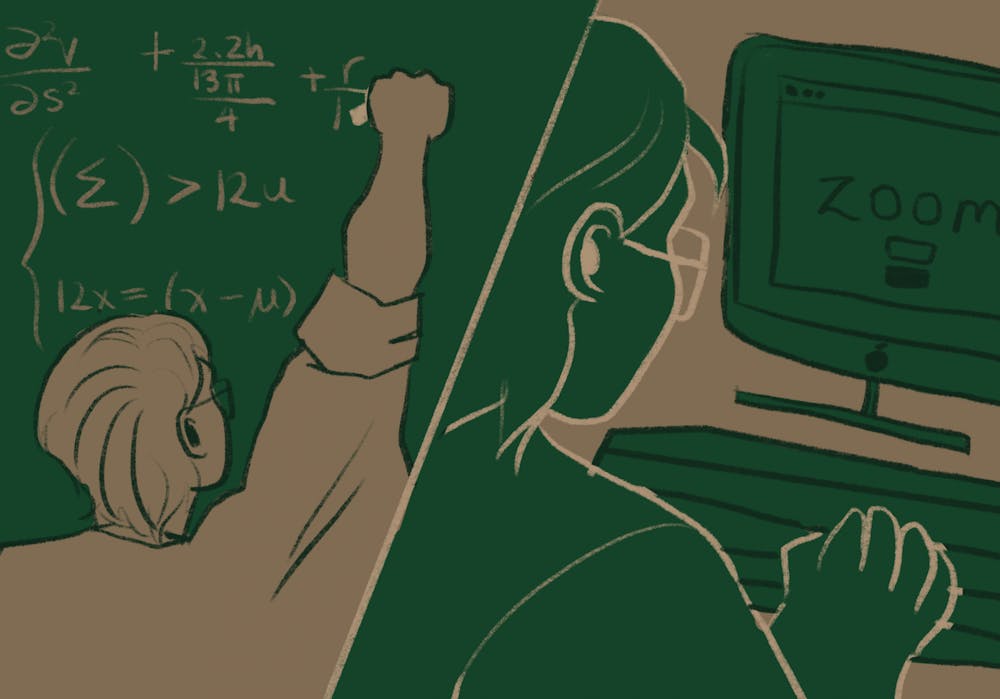After the first week of classes, Georg Vanberg worried about how the rest of the semester would unfold.
Vanberg, Ernestine Friedl distinguished professor of political science, teaches two in-person undergraduate courses, and has a total of 78 students. By Aug. 27, five of his students were in quarantine.
“I was surprised that the number is that high (that’s more than 5%) given the vaccine mandate,” Vanberg wrote in a Friday email. “I do worry that the early numbers we are seeing are not a good sign.”
Three days later, Duke reported that 304 undergraduates tested positive for COVID-19 from Aug. 23 to 29. Administrators issued a number of campus restrictions and policy changes, including offering professors the option to teach undergraduate courses remotely for the next two weeks.
Since the announcement, professors have had to weigh safety concerns against effective teaching methods as they decide whether to keep classes in-person or move them online.
For David Banks, professor of the practice of statistical science, teaching in-person with a mask has not been as successful as teaching remotely without masks. After three students tested positive and three were quarantined in his class of 65 students last week, Banks decided to move the course online Monday night.
He predicts that the number of COVID-19 cases will stay high through the semester. But without the risk of COVID-19 that in-person classes pose, he can now babysit his unvaccinated granddaughter, he wrote in an email.
Vanberg also voiced concerns about the rise in case numbers, but he said that he feels safe enough to continue teaching in-person, citing the effectiveness of masks against the spread of COVID-19.
Vanberg also considered that the “pedagogical advantages of being in person are pretty significant” for his courses. On Friday, he struggled to find the best way to livestream the class to students in isolation and quarantine. He was using Zoom on his iPad, but he found the video and audio quality was not good enough.
Professors are hopeful that for those who return to online learning, the transition will not be too difficult or translate into a decline in class engagement.
“Everyone brought their A-game last year and I’m finding that again this year,” said Priscilla Wald, R. Florence Brinkley distinguished professor of English.
Wald said that her students exhibited great resilience in the face of COVID-19 shutdowns. “I think we had really excellent class discussions—I had two of the best classes I've ever taught,” Wald said about the 2020-21 academic year.
She said that she polled her students and “they absolutely wanted to stay online. Wald noted how patient students have been with the difficulties of both in-person and online learning.
“They’re doing their best to accommodate whatever comes up, and I really appreciate that, because that’s what makes the classes and the whole educational experience work,” Wald said.
Some classes begin semester online, students find it ‘hard to engage’
While some professors shifted online after Monday’s changed protocols, some courses started the semester in an online format, like Biology 201 (Gateway to Biology: Molecular Biology).
The lecture portion of Biology 201 has been taught through Zoom this fall and will continue to be online for several weeks. An online format is much to the dismay of sophomore Savanna Woods, who learned of the change from in-person to online learning only a few days before the semester began.
Woods understands the reasons behind this decision but was especially frustrated that the course is taught through a “flipped” format, where students must watch pre-recorded lectures before virtual class, when the professor answers questions.
“I find it really hard to engage with videos, as I can’t ask the teacher questions when they first arise; I have to wait until the next lecture section,” Woods wrote in an email. “Additionally, [the flipped format] requires even more time from the students, which is unreasonable since [the course] has a lecture time already there. It also causes me to be less engaged during the lecture time, which is very bad for a STEM class that requires focus and engagement to succeed.”
Woods noted that the pre-recorded lectures were from August 2020–a recycling of material from last year.
Another Biology 201 student, sophomore Reah Syed, experienced a different sentiment following the announcement that the course would be virtual. Syed was not as irritated by the flipped format as Woods, but had looked forward to attending her first in-person class of the semester and was disappointed to miss out.
“I find that being able to hear professors lecture in person surrounded by fellow students is a far more engaging learning environment than staring at a computer screen alone,” Syed wrote. “Considering the large number of people in the course and the recent rise in Delta [variant] cases, I realize that it is in everyone’s best interest and health to start the semester off online.”
Online learning beneficial for some
However, some students feel that a return to online school could prove to be beneficial in certain regards. Junior Sam Rusak is currently enrolled in Russian 101 and believes that Zoom classes enhance the learning process by improving clarity in communication. Rusak’s class will meet virtually for the remainder of the week after several students missed a few classes earlier in the semester.
“It can be hard to understand different words or accents when someone is speaking with a mask on and you can’t see their mouth,” Rusak explained. “I like [the class] being online, because then masks are not needed, and seeing people actually speak makes learning a language easier.”
Get The Chronicle straight to your inbox
Signup for our weekly newsletter. Cancel at any time.
Gautam Sirdeshmukh is a Trinity senior and a staff reporter for the news department. He was previously the health & science news editor of The Chronicle's 117th volume.

Milla Surjadi is a Trinity junior and a diversity, equity and inclusion coordinator of The Chronicle's 119th volume. She was previously editor-in-chief for Volume 118.
James Cruikshank is a Trinity first-year and a staff reporter for the news department.

